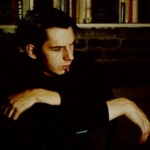Biography
 Robert Creeley (May 21, 1926 – March 30, 2005) was an American poet and author of more than sixty books. He is usually associated with the Black Mountain poets, though his verse aesthetic diverged from that school. He entered Harvard University in 1943, but left to serve in the American Field Service in Burma and India in 1944-1945. He returned to Harvard in 1946, but eventually took his BA from Black Mountain College in 1955, teaching some courses there as well.
Robert Creeley (May 21, 1926 – March 30, 2005) was an American poet and author of more than sixty books. He is usually associated with the Black Mountain poets, though his verse aesthetic diverged from that school. He entered Harvard University in 1943, but left to serve in the American Field Service in Burma and India in 1944-1945. He returned to Harvard in 1946, but eventually took his BA from Black Mountain College in 1955, teaching some courses there as well.
From 1951 to 1955, Creeley and his first wife, Ann, lived on the Spanish island of Mallorca. There they started Divers Press and published works by Paul Blackburn, Robert Duncan, Charles Olson, and others. Creeley wrote about half of his published prose while living on the island, including a short story collection, The Gold Diggers, and a novel, The Island. He traveled between Mallorca and his teaching position at Black Mountain College in 1954 and 1955. They also saw to the printing of some issues of Origin andBlack Mountain Review on Mallorca because the printing costs were significantly lower there.
Creeley received an MA from the University of New Mexico in 1960. He began his academic career by teaching at the prestigious Albuquerque Academy starting in around 1958 until about 1960 or 1961. Afterward, he wandered about a bit before settling into the English faculty of “Black Mountain II” at the University at Buffalo in 1967. He would stay at this post until 2003, when he received a post at Brown University. At the time of his death, he was in residence with the Lannan Foundation in Marfa, Texas.
Creeley first received fame in 1962 from his poetry collection For Love. It was hard for many readers and critics to immediately understand Creeley’s reputation as an innovative poet, for his innovations were often very subtle; even harder for some to imagine that his work lived up to the Black Mountain tenet—which he articulated to Charles Olson in their correspondence, and which Olson popularized in his essay “Projective Verse,” — that “form is never more than an extension of content,” for his poems were often written in couplet, triplet, and quatrain stanzas that break into and out of rhyme as happenstance appears to dictate.
Finding Aid
- Robert Creeley PapersThe Robert Creeley Papers consists largely of correspondence, spanning 1945-1968, bulking 1963-1968, including letters from Charles Olson, Lawrence Ferlinghetti, W.S.Merwin, Witter Bynner, Louis Zukofsky, Henry Rago, Fred Eckman, and correspondence among Creeley, Walter Hamady and Henry Wenning. The collection also includes a number of worksheets, drafts, and notes towards poems, essays, articles, and reviews such as The Charm, Divisions & Other Early Poems, Eight, The Finger, For Joel, For Love,The Island, Pieces, Seven, Words. The Creeley Papers also include works by others, personal papers, and clippings.
Cataloged Items
- Creeley as authorBooks, periodicals and other items with content by Creeley.
- Creeley as subjectBooks, periodicals and other items with content about Creeley.
- Creeley as former ownerBooks, periodicals and other items formally owned by Creeley.
Digital Resources
- Creeley correspondence, drafts, videos and more on MLC50Digitized materials from the Robert Creeley Papers, on the Modern Literature Collection's 50th Anniversary digital collection.
- Creeley YouTube playlistAudio and video recordings of Creeley reading his poetry or speaking about poetry on the Modern Literature Collection's YouTube channel
Additional Resources (external links)
- Creeley on Poetry Foundation's websiteCreeley biographical sketch, poems, prose, contextual collections and bibliography
- Creeley on PennSoundA deep resource for Creeley audio recordings